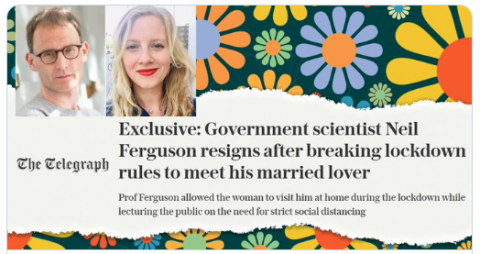Overly Sarcastic Productions
Published 15 May 2020Loki, Loki, Loki. When will you learn that your actions have consequences?
Alternate title: HAIRCUT PRANK GONE WRONG (I ALMOST DIED! NOT CLICKBAIT)
Our content is intended for teenage audiences and up.
PATREON: https://www.Patreon.com/OSP
MERCH LINKS: https://www.redbubble.com/people/OSPY…
OUR WEBSITE: https://www.OverlySarcasticProductions.com
Find us on Twitter https://www.Twitter.com/OSPYouTube
Find us on Reddit https://www.Reddit.com/r/OSP/
May 18, 2020
Miscellaneous Myths: Loki’s Wager
Safetyism
Safetyism is a disposition that has been gaining strength for decades and is having a triumphal moment just now because of the virus. Public health, one of many institutions that speak on behalf of safety, has claimed authority to sweep aside whole domains of human activity as reckless, and therefore illegitimate.
I suspect the ease with which we have lately accepted the authority of health experts to reshape the contours of our common life is due to the fact that safetyism has largely displaced other moral sensibilities that might offer some resistance. At the level of sentiment, there appears to be a feedback loop wherein the safer we become, the more intolerable any remaining risk appears. At the level of bureaucratic grasping, we can note that emergency powers are seldom relinquished once the emergency has passed. Together, these dynamics make up a kind of ratchet mechanism that moves in only one direction, tightening against the human spirit.
Acquiescence in this appears to be most prevalent among the meritocrats who staff the managerial layer of society. Deferring to expert authority is a habit inculcated in the “knowledge economy”, naturally enough; the basic currency of this economy is epistemic prestige.
Among those who work in the economy of things, on the other hand, you see greater skepticism toward experts (whether they make their claim on epistemic or moral grounds) and less readiness to accept the adjustment of social norms by fiat – whether that means using new pronouns or wearing surgical masks. I am regularly in welding supply stores, auto parts stores and other light-industry venues. Nobody is wearing masks in these places. They are very small businesses: an environment largely free of the moral fashions and corresponding knowledge claims that set the tone in large organisations. There is no HR in a welding shop.
A pandemic is a deadly serious business. But we would do well to remember that bureaucracies have their own interests, quite apart from the public interest that is their official brief and warrant. They are very much in the business of tending and feeding the narratives that justify their existence. Further, given the way bureaucracies must compete for funding from the legislature, each must make a maximal case for the urgency of its mission, hence the necessity of its expansion, like a shark that must keep moving or die. It is clearer now than it was a few months ago that this imperative of expansion puts government authority in symbiosis with the morality of safetyism, which similarly admits no limit to its expanding imperium. The result is a moral-epistemic apparatus in which experts are to rule over citizens conceived as fragile incompetents.
But what if this apparatus were revealed to be not very serious about safety, the very ideal that underwrites its authority? What then?
The British Tank Meme
Potential History
Published 1 Dec 2018A look at British tanks and why they are what they are.
Music Used: https://www.youtube.com/watch?v=WSo_d…
https://www.youtube.com/watch?v=PGrxH…End Song: https://www.youtube.com/watch?v=99LRv…
P.O.Box:
Potential History
P.O. Box
524 Beech Grove, IN,
46107Patreon: https://www.patreon.com/potentialhistory
Twitter: https://twitter.com/Tank_Memes
QotD: Science, evidence and “cognitive creationism”
I wrote about this problem in one of my Scientific American monthly columns recently, noting that both the Right and the Left distort science in the service of their ideology. On the Right we see the denial of evolution, vaccinations, stem cell research, and global warming. On the Left we see the distortion or denial of GMOs, nuclear power, genetic engineering, and evolutionary psychology, the latter of which I have called “cognitive creationism” for its endorsement of a blank slate model of the mind in which natural selection only operated on humans from the neck down.
What can we do about this problem? First, we must acknowledge that for most issues most conservatives and liberals are pro-science. Recent surveys show that over 90 percent of both Republicans and Democrats in the U.S., for example, agreed that “science and technology give more opportunities” and that “science makes our lives better.” In other words, anti-science attitudes are formed in very narrow cognitive windows — those in which science appears to oppose certain political or religious views. Knowledge of a subject helps a little. For example, those who know more about climate science are slightly more likely to accept that global warming is real and human-caused than those who know less on the subject. But that modest effect is not only erased when political ideology is factored in, it has an opposite effect on one end of the political spectrum. For Republicans, the more knowledge they have about climate science the less likely they are to accept the theory of anthropogenic global warming (while Democrats’ confidence goes up).
In another Scientific American column I wrote about this “backfire” effect, in which the more information you give someone that contradicts a cherished belief, the less likely they are to change their mind; in fact, they double-down on the belief. But this only applies to important political, religious, or ideological beliefs.
If you don’t have a dog in the fight then the facts can change your mind. But the cognitive dissonance created by facts counter to beliefs by which you define yourself will almost always be resolved by spin-doctoring the facts, not by changing your mind. Thus, when I engage in debate or conversation with creationists, for example, I don’t give them the choice between Darwin and Jesus, because I know who’s going to lose that one. Instead, I try to convince them that evolution was God’s way of creation, just like people in Newton’s time and after came to believe that gravity was God’s way of creating solar systems. I don’t believe that myself, of course, but the point is to get people to embrace science, not to win an argument. With climate deniers, I know from research and personal experience that when they hear “global warming” they think “anti-capitalism,” “anti-freedom,” “anti-American way of life.” So I take that off the table by showing them how investing in green technology is going to be one of the most lucrative enterprises in the history of capitalism. I call this the Elon Musk Model.
Michael Shermer, interviewed by Claire Lehmann, “The Skeptical Optimist: Interview with Michael Shermer”, Quillette, 2018-02-24.






